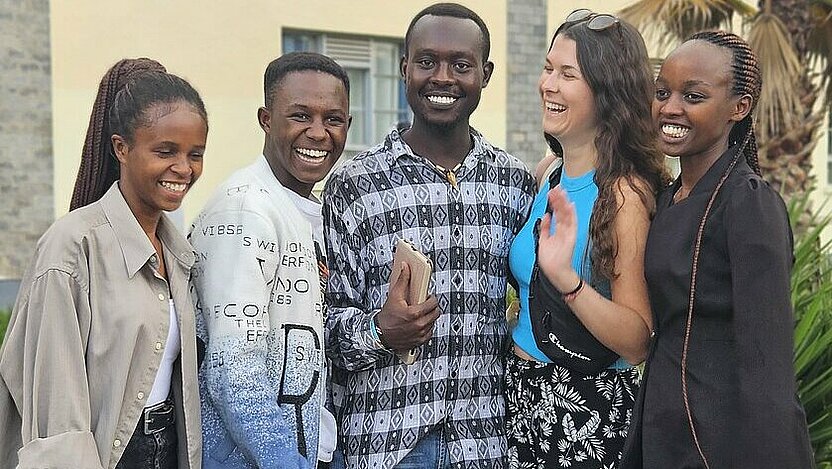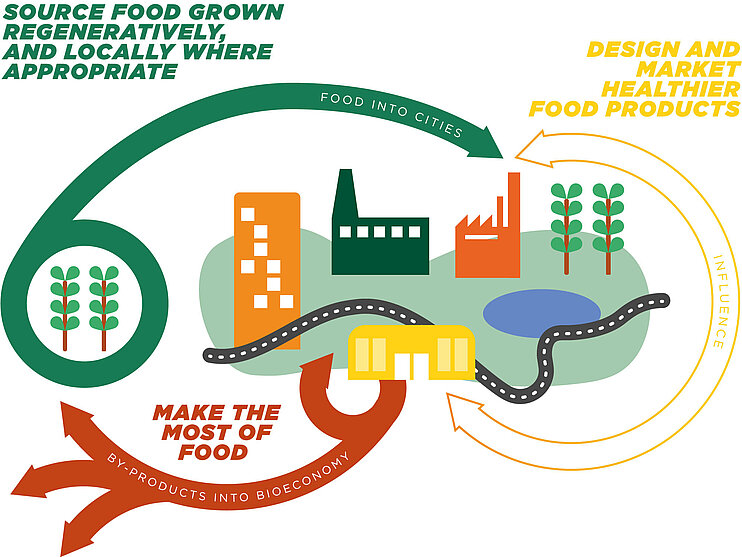Circular Agro-Economy
In cooperation with the University of Rwanda, an interdisciplinary master course on circular economy in agriculture and applied entrepreneurship is being introduced. Three companies are supporting the development to ensure a strong practical orientation.
Circular Agro-Economy (Rwanda-CAE)
Advancing sustainable economic development in Rwanda through circular agro-economy (Rwanda-CAE)

The circular economy poses great possibilities for Rwanda’s agro-economic sector with positive effects on environment and economy. This project will implement an interdisciplinary practice-oriented master program for circular agro-economy and applied entrepreneurship in a blended learning format at University of Rwanda: M.Sc. Circular Agro-Economy. This will drive the creation of innovative startups for the realization of circular agro-economy principles. Individual modules of this Masters will be offered to professionals in the form of short certificate courses.
In addition, the project will conduct applied research on the creation of sustainable business models for agro-economy cycles.
An expert network of relevant institutions for circular economy innovations in Rwanda and Germany will be established, including the project business partners SINA GERARD Ese URWIBUTSO, Sharkbite Innovation GmbH and En-Crops GmbH.
What is the Circular Economy?
The idea of a circular economy is to create cradle-to-cradle value cycles instead of linear value chains, mimicking natural ecological processes of decomposition and growth in order to eliminate waste and optimize products’ and materials’ life cycles. (Ellen MacArthur Foundation, 2017) (opens in a new window)
The overarching aim of a circular agro-economy is to accomplish sustainable development, while ensuring environmental quality, economic prosperity and social equity. (Kirchherr, J., Reike, D., & Hekkert, M. (2017). Conceptualizing the circular economy) (opens in a new window)

funded by the DAAD with financial means of the German Federal Ministry for Economic Cooperation and Development (BMZ)
Project Description
Project Description
Project Description
The concept of circular economy poses great possibilities for Rwanda’s agro-economic sector. Circular business models adapted to local contexts can strengthen the economic vitality of urban and rural areas. To spark the development of circular business models in Rwanda’s agro-economy sector, the notion of a circular economy along with entrepreneurial thinking techniques must be integrated into the teaching programs at universities.
Hence, the primary goal of this joint project of University of Rwanda (UR) and Neu-Ulm University of Applied Sciences (HNU) is to implement an interdisciplinary practice-oriented master program for circular agro-economy and connected applied entrepreneurship topics in a blended learning format at UR. The overarching goal is to drive the creation of qualified and innovative business concepts and startups for the realization of circular agro-economy principles. The proposed name of the interdisciplinary Master of Science Program is “M.Sc. Circular Agro-Economy” and integrates core competences including Applied Entrepreneurship and Agricultural Economy.
A secondary goal of the project is the implementation of a highly practice-oriented, e-learning-based certificate course offering for circular agro-economy innovations for professionals, externals, community decision makers and potentially interested graduate students of other programs at UR. This offering will consist of adapted, highly practice-oriented parts of the above mentioned master program and shall expand the reachable target groups for circular agro-economy topics and help drive the interdisciplinary innovation creation by the participating practitioners.
The interdisciplinary approach is very important to equip graduates with transferable, practice-oriented skills. The Rwandan Ministry of Education (MINEDUC) has strongly emphasized the importance of practice-oriented entrepreneurship education across all the disciplines delivered in higher learning institutions. Thus, this project contributes to the Rwandan national higher education agenda.
The integration of applied entrepreneurship elements aims to create and support innovative startup teams, by means of developing prototypes, validating markets and ultimately registering new ventures, which successfully realize circular agro-economy business models in Rwanda. Job opportunities, particularly for the growing young population in Rwanda, are created and thus poverty mitigated.
Furthermore, the project will conduct collaborative and practice-oriented applied research projects on the creation of sustainable business models for the realization of agro-economy cycles in both rural and urban Rwandan settings, which will cover identified research gaps on circular economy innovations in Rwanda. The results will be integrated in the teaching modules. UR as well as HNU students will be included with their thesis projects into these applied research projects.
An expert network of representatives of relevant institutions and industry players for circular economy innovations in Rwanda and Germany will be established, including the project business partners SINA GERARD Ese URWIBUTSO, En-Crops GmbH and Sharkbite Innovation GmbH. An international collaboration and open innovation platform for knowledge transfer and collaborative innovation development will be established to allow Rwandan innovators and German innovators to cooperate virtually. Regular entrepreneurship excursions of HNU students to Rwanda will support this process.
Finally, HNU intends to gain further expertise and experience through this project, especially in the field of application-oriented development cooperation with East Africa and Rwanda. This contributes to the establishment of further partnerships in African countries. The broader range of projects in African countries also has an indirect positive impact on other projects, as the knowledge gained could also be utilized for them.
Activities
2021First Project Year
- Project kick-off
- Curriculum development and accreditation of the Master's degree program
- Implementation of a web-based innovation platform
- Trainings of Trainers
- University-Industry-Conference
- Joint research on circular economy
2022Second Project Year
- Content development and production of e-learning modules
- Trainings of Trainers
- University-Industry-Conference
- Joint research on circular economy
- Co-teaching of e-learning based certificate courses
- Joint mentoring of startup-teams
- Excursion wit HNU students to Kigali
2023Third Project Year
- Trainings of Trainers
- University-Industry-Conference
- Joint research on circular economy
- Co-teaching of e-learning based certificate courses
- Joint mentoring of startup-teams
- Excursion wit HNU students to Kigali
- Multiplicator workshop in Kigali to increase the reach of the Traings of Trainers
- Start of the first cohort of the new degree program M.Sc. Circular Agro-Economy
2024Fourth Project Year
- Trainings of Trainers
- University-Industry-Conference
- Joint research on circular economy
- Co-teaching of e-learning based certificate courses
- Joint mentoring of startup-teams
- Excursion wit HNU students to Kigali
- Multiplicator workshop in Kigali to increase the reach of the Traings of Trainers
- Project evaluation and graduation of the first cohort
What is circular economy?
Link list on the topic of circular economy
10 elements of agroecology (opens in a new window)
In this Knowledge Hub the Food and Agriculture Organization of the United Nations explains the 10 elements of agroecology. The concept of agroecology encompasses organic farming with the goal of creating a self-sustaining, regional food system embedded in ecological cycles.
Framework for circular cities (opens in a new window)
Local Governments for Sustainability is a global network of more than 1,750 local and regional governments committed to sustainable urban development. On their website, they present a framework with possible actions for circular cities. You can learn what a circular city is, how the framework is used and how it was created here.
Circular practical example in East Africa (opens in a new window)
In this video, the Ellen MacArthur Foundation presents a practical example of a regenerative, circular farm. The One Acre Farm in Uganda is based on the approach of exchanging resources meaningfully throughout the farm, so that, as in nature, nothing is wasted and instead is used on nother part of the farm.
Circular methods for circular innovations (opens in a new window)
The Ellen MacArthur Foundation's Circular Design Guide highlights a wide variety of methods that create an understanding of circular innovation. The guide helps both companies and individuals understand and apply circular methods.
Circular Design (opens in a new window)
The Ellen MacArthur Foundation explains various aspects of circular design in this Learning Hub. In this archive you will find information about the term design, the process and strategies of circular design and how to move from products to services.
Circular Design in Africa (opens in a new window)
This video from the Ellen Macarthur Foundation uses practical examples and projects to discuss the circular economy in Sub-saharan Africa. The discussion addresses the questions: who is advocating for a circular economy? What is the role of design in the transition to a circular economy? What does this mean for a rapidly growing young population?
Circular Economy (opens in a new window)
The company Circle Economy compiles a collection of case studies, reports, frameworks, guidelines and practical examples around the circular economy in this Knowledge Hub.
Circular Economy (opens in a new window)
The Ellen MacArthur Foundation's Circular Economy Show is a series of recorded events on the topic of the circular economy. In each episode, experts lead debates on different aspects of how to transition from a linear take-make-waste economy to a circular economy.
Circular Economy in Africa (opens in a new window)
The ACEN Foundation (short for African Circular Economy Network) provides information on the circular economy in Africa. The content is related to capacity building, fundraising and various projects. The aim here is to raise awareness of the topic and to promote knowledge transfer and cooperation for the creation and support of companies.
Circular Economy in Africa (opens in a new window)
Here, the Ellen MacArthur Foundation provides a collection of findings that explore the key issues in accelerating the circular economy on the African continent.
Circular Economy (opens in a new window)
The Ellen MacArthur Foundation discusses the circular economy in detail. They define the term, explain different materials, explain economic benefits and the opportunities that the circular economy offers both companies and individuals.
Circular food system (opens in a new window)
EIT Food is a food community supported by the EU. On their website they talk about challenges of food waste and possible solutions through a circular food economy.
Study by the Yunus Environment Hub (opens in a new window)
The Yunus Environment Hub presents a qualitative study on "Risks and Opportunities of Plastic Credit Financing Instruments".
Project Deliverables
M.Sc. Circular Agro-Economy
- Interdisciplinary, practice-oriented, blended-learning-based master's program
- Content: circular economy, agricultural economics, entrepreneurship
- Objective: to stimulate the development of circular business models in Rwanda's agro-economic sector
- Project intervention: joint development of the curriculum, training of lecturers
- Brochure with further information
Certificate Courses
- Highly practice-oriented, e-learning-based certificate courses for circular agro-economy innovations
- Target group: professionals, practitioners, community decision makers, graduate students
- Project intervention: joint curriculum development, co-teaching
- Benefits: life-long learning, pilot run for the M.Sc.











